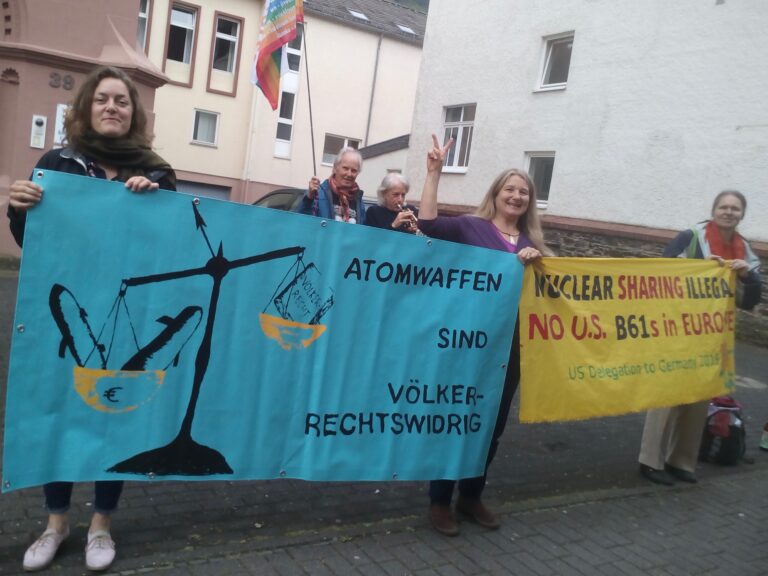
Stefanie Augustin and Marion Küpker protest US nuclear weapons in Germany.
Novel Nuclear Weapons Protest Case Appeal Filed
With the European Court of Human Rights in Nuclear
John LaForge / CounterPunch
(November 15, 2021) — Two nuclear weapons opponents have filed a novel complaint with the European Court of Human Rights (ECHR) in Strasberg, France, alleging that German courts have unfairly refused to consider defense testimony from expert witnesses regarding the outlaw status of deploying US nuclear weapons in Germany.
On November 11, 2021, Stefanie Augustin of Dortmund and Marion Küpker of Hamburg submitted the appeal through their lawyer Anna Busl. The ECHR will now decide whether to review the case and issue a ruling, or to deny it further consideration.
Background: On Sunday, July 15, 2018, Augustin and Küpker were among eighteen people from four different countries who entered Germany’s Büchel air base, near Cochem, where approximately 20 US nuclear bombs are kept at the ready by the US Air Force’s 702nd Munitions Support Squadron. Seven of the activists came from the United States, six from Germany, four from The Netherlands, and one from England.
In five groups, they clipped fences to enter the base and once inside some climbed onto a hangar where nuclear weapons may have been stored, and others read aloud to soldiers a warning about military and civilian laws that prohibit planning and preparing attacks using nuclear weapons.
Augustin said: “I took part in this action because it is the only way for me as a citizen to be able to take these state violations of the law to court. This includes the practice of Germany’s criminal nuclear participation in NATO. Since we have exhausted all national court appeals with our 14th constitutional complaint — which in our case was again rejected by the Federal Constitutional Court — we have appealed to the European Court of Human Rights for the first time.”

German activists protest US nuclear weapons at Büchel AFB.
Küpker (a 2019 Aachen Peace Prize winner for the campaign “Büchel is Everywhere: Nuclear Weapons-Free Now!”) added:
“International law is superior to federal German law. The courts should have examined whether we actually had sufficient and urgent reasons to draw attention to this state of emergency with such an action. Our requests to provide expert witness testimony were simply rejected by the courts.
However, the courts are ordinarily obliged to examine questions of international and constitutional law. So the appeal is based on our ‘right to be heard’ under Article 6, Para. 1 of the European Convention on Human Rights, and on our ‘right to life’ under the convention’s to Art. 2, Para. 1 having been violated in the local, regional and constitutional courts.”
The deployed US nuclear weapons violate the public’s “right to life” and thereby the European Convention, the appellants argue, because the perpetual threat to use Büchel’s 20 US H-bombs in attacks launched by Germany’s Tornado jet fighters, is routinely practiced in exercises including last month’s “Steadfast Noon.” The US bombs hang “like the ‘sword of Damocles,’” says Küpker, “because the credible threat of nuclear war is continuous, raises the chances of a global nuclear war, and makes Germany a target.”
Over the past two years, about 50 prosecutions for nonviolent “go-ins” at Büchel base have taken place in Cochem district court and in the Koblenz regional court. (Trial reports can be found here.) And over the past 25 years, 14 appeals by nuclear weapons critics to Germany’s highest court, the Constitutional Court in Karlsruhe, have been rejected.
The July 15, 2018 action, and others in 2017 and 2019, were organized jointly by Nonviolent Action to Abolish Nuclear Weapons in Germany (GAAA) and the US organization Nukewatch where I work. The Campaign Council of Germany’s nationwide support group “Abolish Nuclear Weapons: Start with Us!” — made up of over 70 organizations — has declared its support this first-ever anti-nuclear movement appeal to the ECHR.
So, after decades of protests and resistance to the US nuclear weapons in Germany (there were as many as 7,000 during the Cold War), the appeal to the ECHR provides its judges a rare opportunity. Without having to condemn the United States’ hubris, hypocrisy, or destabilizing nuclear threat-mongering, the judges can simply reaffirm a defendant’s right to a fair trial court — a court that is unbiased enough that defendants are allowed to present expert witness testimony — and then urge the German courts to listen to it.

John LaForge is a Co-director of Nukewatch, a peace and environmental justice group in Wisconsin, and edits its newsletter.
Posted in accordance with Title 17, Section 107, US Code, for noncommercial, educational purposes.